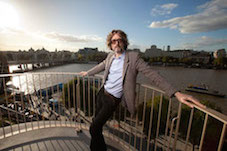A Polish-born English novelist, master in the formats of long short story and novella, a form of story longer than conventional short story but shorter than a novel. Some of Conrad’s most acclaimed works have been written in these formats, most notably Heart of Darkness.
≈ ≈
• Read
¤ ‘The Lagoon‘ ⇐(from «Tales of Unrest», the first collection of short stories by Joseph Conrad published in his lifetime_1898)
¤ Heart of Darkness ⇐[1899]
• Read & listen:⇒http://etc.usf.edu/lit2go/99/heart-of-darkness⇐ / Listen ⇓
←
From A Room for London – a boat-like structure perched on top of the Queen Elizabeth Hall at London’s Southbank Centre – on Sunday 30 September 2012, Jarvis Cocker read some passages from Joseph Conrad’s Heart of Darkness with accompaniment from cellist Philip Sheppard and his funny instrument [from count 04’15»]
←Click for the performance. Transcript below…
The Nellie, a cruising yawl, swung to her anchor without a flutter of the sails, and was at rest. The flood had made, the wind was nearly calm, and being bound down the river, the only thing for it was to come to and wait for the turn of the tide.
The sea-reach of the Thames stretched before us like the beginning of an interminable waterway. In the offing the sea and the sky were welded together without a joint, and in the luminous space the tanned sails of the barges drifting up with the tide seemed to stand still in red clusters of canvas sharply peaked, with gleams of varnished sprits. A haze rested on the low shores that ran out to sea in vanishing flatness. The air was dark above Gravesend, and farther back still seemed condensed into a mournful gloom, brooding motionless over the biggest, and the greatest, town on earth.
[. . .] Forthwith a change came over the waters, and the serenity became less brilliant but more profound. The old river in its broad reach rested unruffled at the decline of day, after ages of good service done to the race that peopled its banks, spread out in the tranquil dignity of a waterway leading to the uttermost ends of the earth. We looked at the venerable stream not in the vivid flush of a short day that comes and departs for ever, but in the august light of abiding memories.
[. . .] The tidal current runs to and fro in its unceasing service, crowded with memories of men and ships it had borne to the rest of home or to the battles of the sea. It had known and served all the men of whom the nation is proud, from Sir Francis Drake to Sir John Franklin, knights all, titled and untitled–the great knights-errant of the sea. It had borne all the ships whose names are like jewels flashing in the night of time, from the Golden Hind returning with her round flanks full of treasure, to be visited by the Queen’s Highness and thus pass out of the gigantic tale, to the Erebus and Terror, bound on other conquests– and that never returned. It had known the ships and the men. They had sailed from Deptford, from Greenwich, from Erith– the adventurers and the settlers; kings’ ships and the ships of men on `Change; captains, admirals, the dark «interlopers» of the Eastern trade, and the commissioned «generals» of East India fleets. Hunters for gold or pursuers of fame, they all had gone out on that stream, bearing the sword, and often the torch, messengers of the might within the land, bearers of a spark from the sacred fire. What greatness had not floated on the ebb of that river into the mystery of an unknown earth! The dreams of men, the seed of commonwealths, the germs of empires.
[. . .] The offing was barred by a black bank of clouds, and the tranquil water-way leading to the uttermost ends of the earth flowed somber under an overcast sky–seemed to lead into the heart of an immense darkness.
¤ Orson Welles _ The Mercury Theatre
←Broadcast recorded over the air, not in the studio. Hence, the poor audio quality.
The story details an incident when Marlow, an Englishman, took a foreign assignment from a Belgian trading company as a ferry-boat captain in Africa. Although Conrad does not specify the name of the river, at this time Congo Free State, the location of the large and important Congo River, was a private colony of Belgium’s King Leopold II. Marlow is employed to transport ivory downriver; however, his more pressing assignment is to return Kurtz, another ivory trader, to civilization in a cover up. Kurtz has a reputation throughout the region.
Orson Welles adapted and narrated the novel for his Mercury Theater radio show. When Welles signed his contract with RKO Radio Pictures in 1940, he considered making films based on Heart of Darkness and on the C. Day Lewis novel The Smiler With a Knife (1939) before deciding on Citizen Kane (1941).
◊→ Apocalypse Now
Francis Ford Coppola’s 1979 motion picture moves the story from the Congo to Vietnam and Cambodia during the Vietnam War.
This is the end – My only friend, the end
Of our elaborate plans, the end
Of everything that stands, the end
No safety or surprise, the end
I’ll never look into your eyes…again Can you picture what will be – So limitless and free
Desperately in need…of some…stranger’s hand
In a…desperate land
Lost in a Roman…wilderness of pain
And all the children are insane
All the children are insane
Waiting for the summer rain, yeah
>
♦ Nicolas Roeg‘s 1993 version aired by TNT in 1993, starring Tim Roth as Marlow and John Malkovich as Kurtz
A trading company manager travels up an African river to find a missing outpost head and discovers the depth of evil in humanity’s soul.





Deja un comentario